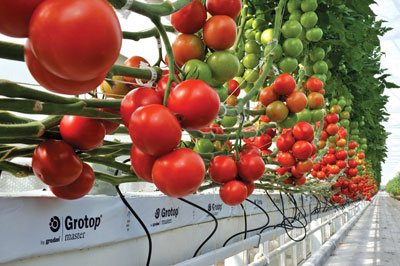
When the Grodan Group decided to expand its stone wool production, it
chose to invest – and invest substantially – in one of its fastest
growing markets.
When the Grodan Group decided to expand its stone wool production, it chose to invest – and invest substantially – in one of its fastest growing markets.

|
|
| Helping launch the new line were, left to right,Trent Ogilvie (Roxul), Harold van Gool (Grodan), Don Courtemanche (Grodan), Hub Janssen (Grodan), and Milton Mayor Gordon Krantz. Advertisement
|
The supplier of innovative and sustainable stone wool substrate products for the commercial horticulture sector has opened a high-tech production line in North America at the Roxul Inc. factory in Milton, Ontario.
This location is strategically located in south-western Ontario between two of the largest greenhouse regions on the continent – the Niagara region and Essex County – for easy market access.
Officials of both Grodan and Roxul welcomed dozens of growers, other industry guests and local government officials to an open house in mid-September to officially open the new production line.
Among officials taking part in the ceremonies were Roxul North America president Trent Ogilvie; Grodan North America sales director Harold van Gool; Grodan sales manager Don Courtemanche; Grodan managing director Hub Janssen; and Milton Mayor Gordon Krantz.
“This is not only an important step for us,” noted company managing director Hub Janssen, “but it is also an important step for the development of the greenhouse industry here in Canada and throughout the rest of North America.”
Manufacturing in Canada means Grodan can better serve its customers by “tremendously improving our time to market,” said Janssen, “and by cutting our transport costs and our CO2 emissions.”
He said that “sustainable food production is receiving more and more attention from governments and other organizations. How are we going to produce food for an extra two billion people in 2050, with half of the resources used today?”
The concept of Precision Growing, which Grodan promotes, can help meet those goals, said Janssen. “Nowadays we know that with Precision Growing, you can give plants exactly what they need. You not only have the most effective way of feeding the plant, but also the most efficient one. The grower can save water and nutrients, in addition to safeguarding good soils.”
Trent Ogilvie, president of Roxul Inc., said his company is excited with the new line. “For Roxul, the addition of Grodan allows us to better utilize our existing capacity. This means we can continue with our accelerated growth in North America and build even more factories.”
The new line has created nine new jobs at Roxul, with plans for another 18 positions over the coming year.
Grodan sales director Harold Van Gool said the new production line reflects the faith and enthusiasm the company has in the North American market. And this new line, he added, is only the start. “We are looking forward to making further investments in the future.”
A CUBIC METRE OF BASALT SUFFICIENT FOR GROWING 1M CUKES
■ The basic material for Grodan’s substrate is basalt – volcanic rock that is extracted according to strict environmental regulations. This material is then turned into stone wool slabs, blocks and plugs in an efficient manufacturing process.
One cubic metre of basalt produces 50 cubic metres of stone wool, which would be sufficient for the growing of 350,000 kilograms of tomatoes or one million cucumbers.
At the end of the crop cycle, stone wool can be recycled into other products. In Ontario, for example, used stone wool is converted into bricks. In the Netherlands, almost all used stone wool is recycled into other uses.
Grodan has been so successful with its environmental initiatives that its products have earned a number of international certificates. Among them is the Ecolabel, the European Union’s environmental quality mark for non-food products.
ACCIDENTIAL DISCOVERY OF STONE WOOL HORT PROPERTIES
■ The creation of Grodan’s substrates was not intentional, as managing director Hub Janssen explained.

|
|
“Like so many other great inventions in the world, the creation of Grodan substrates was actually … an accident.”
The new properties of stone wool were discovered years ago by employees of the Rockwool Group. Stone wool insulation material meant for building construction coming off the production line appeared to be faulty. It was placed outside as waste material. However, when this material was collected a few weeks later, workers were surprised to see small plants growing on the stone wool. This, of course, triggered the idea to grow plants on stone wool. “Together with researchers and universities, the idea was further developed and resulted in the establishment of the Grodan Group in 1969. A new technology was born … cultivation on substrate, which we now call Precision Growing.”
Dr. Youbin Zheng, the environmental horticulture chairperson for the University of Guelph/Vineland Research and Innovation Centre research partnership, was guest speaker at the open house ceremonies.
“The world’s population has been steadily increasing and the amount of arable land has been consistently decreasing,” said Zheng. “There is a challenge in feeding the world, and we think greenhouses offer one of the solutions.”
Print this page